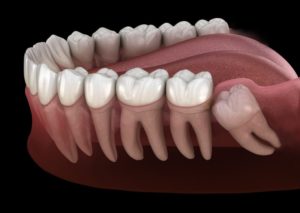
Wisdom teeth, also known as the “third molar” are the teeth that are in the very back of your mouth. They also are the last of your pearly whites to develop, normally coming through the gums between the ages of 17-21. That’s why they are called “wisdom teeth”. About 85% of people must eventually get them removed. However, not everyone has wisdom teeth. The Dental Research Journal states that up to 37% of people are missing one or more of their third molars. Read on to learn more about wisdom teeth and their development (or lack thereof!).
Why Do Some People Never Get Their Wisdom Teeth?
Although it is not completely clear why some people don’t develop some or all their third molars, there are a few leading theories.
The most common may be genetics. If your parents don’t have them, you may not either. Another genetic theory is related to distant ancestors. Ancient ancestors needed a third set of molars to help them consume their rough diet. They also didn’t have the luxury of regular dental cleanings, so extra teeth helped if they began to lose some due to decay, accidents, or old age.
Now, humans tend to eat foods that are easier to eat, and we have modern dental care. They may be adapting to the fact that the third molars are no longer necessary.
Do You Have Wisdom Teeth?
Most people have four, but some just have one. A few people can develop five or more! Keep in mind, just because you don’t see or feel your third molars, doesn’t mean they don’t exist.
Most people have wisdom teeth, but they will more than likely have to be removed to prevent potential complications. Visit your dentist to find out if you have wisdom teeth and how many–a routine X-ray will easily give that information. Regular dental visits are important, especially for children and young adults, so they can be monitored for future problems. If and when your third molars develop, your dentist will be able to recommend the appropriate treatment.
Why Do Wisdom Teeth Often Need to Be Removed?
Some people keep their wisdom teeth for their whole lives without experiencing any problems. But, as stated above, wisdom teeth can cause a problem by becoming stuck (impacted) in the gums.
A third molar that becomes impacted can cause tooth pain, swelling, redness, and infection. It can also cause jaw pain as it tries to break through the gums. If there is not enough room for your wisdom teeth, crowding and pain can result in the surrounding area/teeth. Removal will be necessary.
Removal, while the third molar is still developing and not causing any problems, will be easier than removing it later in the growth process. Your dentist can help track their growth and guide you to the best decision for your oral health and comfort.
There are many interesting things to know about wisdom teeth. Now that you have added to your dental wisdom, you are more informed to make the best choices for your dental health!
About the Author
Dr. Mark Hochman and the team at La Plata Dental give you personalized dentistry with a focus on comfort. With the latest dental techniques and technologies, his priority is for you to receive high-quality and efficient service to fit any of your oral health needs, including issues with your wisdom teeth. With over 40 years of experience, he performs both regular and surgical tooth extractions if necessary. To schedule an appointment, contact him through his website or call (240) 349-7358.
 La
Plata
La
Plata